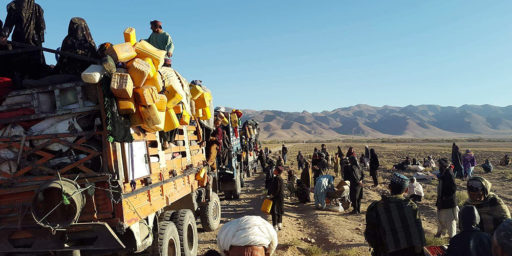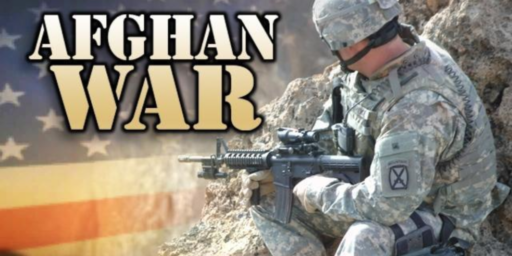Wars Against Rogue States Create New Problems
John Robb has an interesting if depressing post on what he views as the failure of the “we fight them there so we don’t have to fight them here” grand strategy. He notes three major unintended consequences:
- Collapsing rogue states doesn’t reduce the threat, it does exactly the opposite: it creates ungoverned spaces and failed states where non-state groups thrive.
- Nation-building is impossible in this situation. The humpty-dumpty rule applies. All of the talk about mismanagement of Iraq is fruitless, counter-productive (and should be seen merely as a rationalization of failure as we saw in Vietnam and the Russians did in Afghanistan), and will only lead to disasters in the future if we try it again. Since the real threat is from non-state groups, pushing nation-states (even rogue ones) into failure only makes the situation worse. It catalyzes the development of non-state groups. As a result, rectification of the situation becomes impossible since these non-state groups, with newly developed organizational models and methods of attack (systems), can easily collapse our attempts to return cohesion to the nation-states we toppled.
- It seeds the global development of non-state groups. As we have seen in London, Madrid, Toronto, and increasingly in the US (Reuters), new opponents will spontaneously emerge from nascent primary loyalties in response to these attacks. The more pressure applied, the greater the number of threats we face in our own back yard. Further, these groups are learning the lessons of guerrillas in Iraq — the ultimate proving ground of advanced fourth generation warfare — to become global guerrillas. As they continue to evolve, the very oil supply we hoped to secure will be increasingly put at risk (as we have seen in Nigeria, Iraq, Saudi Arabia, etc.).
I dissent somewhat from the first of these but largely agree with the second and third. The problem, however, is that policy analysis can not be conducted in a vacuum; it must instead be balanced against the available alternatives.
My quibble with the idea that taking down rogue states increases the threat is that, given the proper timing, it is not necessarily so. Surely, taking out the Taliban regime in Afghanistan in, say, 1999 or even 2000 would have made 9/11 less likely. Or, throwing caution to the wind and risking the invocation of Godwin’s law, one would think removing Adolf Hitler and the Nazis from power in, say, the summer of 1939 would have been worthwhile.
Like Robb, I remain incredibly skeptical of our ability to conduct nation-building in states not previously experienced with modernity. (The last qualification removes the examples of post-WWII Germany and Japan, where nation-building was spectacularly sucessful.) Still, despite the fact of guerrilla groups re-inserting their power there, post-invasion Afghanistan is almost certainly less dangerous than the one that sheltered Osama bin Laden.
Further, while I grant that the events in London, Madrid, and Toronto are at least partly responses to toppling the regimes in Iraq and Afghanistan, it doesn’t follow that things would be better had we not taken those actions. Surely, a non-response to the 9/11 attacks would have emboldened al Qaeda. Certainly, leaving the Taliban in place after Khobar Towers, the Cole attack, and various other al Qaeda actions in the 1990s didn’t prevent 9/11.





Robb points out the down side to engaging our enemies abroad without recognizing the upside at all. Everybody can be partially right but that doesn’t mean our current strategy is still not the best available.
Taking on the Taliban and Saddam helped by establishing that there will be consequences for actions taken against the United States. The Muslim world has for years assumed the US to be a paper tiger easily intimidated and unwilling to respond to state or non-state aggression. Now they understand that we will respond and they or people around them will die. This new deterrence is real. The new respect is priceless.
Too many opponents of the present administration and even supporters of the administration expect the perfect execution of foreign policy. It won’t happen. Mistakes will be made and a learning curve will be in place so we can expect slow progress but steady progress. It’s just like the expectations put upon our military, no foul ups allowed. Well in the real world, the grown up world, we can expect a bumpy ride while still going down the right path. In the mean time the passengers should hush up a bit and let the driver drive.
Steven,
Robb’s credentials are rather impressive on these matters. He’s a retired Air Force officer, so he’s certainly not naive enough to think there are no trade-offs.
And even aside from his expertise, citizens in democracies have every right to speak their mind. “Let the driver drive” is not too far from Fascism, frankly.
The presence of people in our societies with loyalties to ideologies that seek the destruction of our societies, and are willing to act on these loyalties, is very troubling and will likely plague us for years to come, but I think the idea that these people were dormant and that our response in the Long War “activated” them is incorrect, and for all his arguments, I cannot see how he can substantiate the claim with data. Indeed, the establishment, growth and activity of non-state terror groups within the West long predate our post-9/11 response, and thus it seems to me this alone discredits his conclusion about OIF and OEF seeding the development of global terror groups. The first attack in 93 on the WTC was abetted by “home-grown” terrorists, including a member of the US Army. This at a time when the US response to terror was completely different than now. Plots, fortunately foiled, existed in the 90s in Europe to carry out atrocities like blowing up the Strasbourg Christmas market and flying hijacked aircraft into the Eifel Tower. All these during times when the Western (US) response to terror was quite supine.
He seems to make the error that correlation and causation are linked – we go to war in the Middle East, there are terror attacks at home, thus we must have created these groups through our actions. If you have in your midst groups of people who hold loyalties to extreme ideologies and are willing to attack their host societies, then it seems to be that these people will be a problem no matter what; not going in to Afghanistan or Iraq would not prevent their emergence.
He also builds a straw man right up front: he states that our strategy holds that non-state terror threats do not exist, only rogue state terror threats – this is flat-out false, nowhere does our national security strategy state either explicitly or implicitly that this is the case.
For a man of his credentials, I would expect him to be more thorough in his research backing up his claims before putting them out for the public to see.
Perusing his blog, he reminds me of some around my place of work who are proponents of EBO – people who are in my opinion lost in jargon and pseudo-scientific analysis (by which I mean the application of numerical analysis techniques to themes that are largely unquantifiable). There is more than a whiff of “war by calculus” here.
James,
“Let the driver drive” is far from fascism. We have regular elections and two other branches of government that prevent that from happening. In between those elections there is a certain civic responsibility to allow our elected officials to govern without undermining their efforts.
Today we not only see partisan attempts to undermine foreign policy but we also see some who voted for that policy and now want it both ways. Support the President with votes in congress and then speak against the Presidents policy in the press. Certainly we can agree that is not the way to do things.
I don’t question the expertise of Robb but if he knows the trade offs he has a responsibility to share that with the casual reader. Giving only half the story can be a serious disservice.
I would much rather you have said that “let the driver drive” would give the President too much power. Calling it “not too far from Fascism” is not too far from Godwin’s law.
That said, I don’t think I have ever thanked you and your cohorts for this blog. Intelligent and engaging it is clearly one of the best.
Steven: Yes, we have elections. Most of them are narrowly decided at the presidential level. Regardless, that doesn’t mean we don’t have the right to criticize the winners’ policies or, in this case, assess their consequences.
Indeed, it would be rather difficult to hold meaningful elections if criticism of officeholders and their policies were deemed off limits because they are “undermining their efforts.”
Thanks for your comments on the site. One of the things we strive for, in the main, is to treat the arguments of opponents as well intentioned. Certainly, Robb hopes America wins its war against the jihadis; he is just pointing out how incredibly difficult that will be.
One problem with preventative war can be established by analogy to chess, where a great deal can depend upon the potential success or failure of the “attacking game.”
The basic idea of the attacking game is that you mobilize your forces, send them across the board, and essentially strangle your opponent in his bed – before he gets time to get moving himself. Many of the famous gambits in chess, the King’s Gambit, the Danish Gambit, and so forth, have this basic idea – as do other types of attack as well.
As such, the Bush approach to his so-called “War on Terror” bears semblance to the attacking game. He has sent large forces crashing into Afghanistan and Iraq with the basic idea that he will thereby strangle perceived terrorist threats. ( Never mind, for present purposes, what is meant by “terrorist.”)
The problem with the attacking game is that it doesn’t always work. There are not one but two ways of looking at this sending of the attacker’s ( usually White ) forces into Black’s camp. The first is the threatening aggression described above. But Black can also view this assault another way. By so advancing his forces, White has presented Black with many easy targets, which Black can then pick off. Many attacking games end, not with White’s pounding Black into submission but rather with White’s exhaustion – whereupon Black comes back and destroys White.
What Robb essentially is asserting is that the War on Terror is becoming such an exhausted attack, in which the American soldiers stationed in Iraq increasingly are themselves becoming targets.
Such are the risks of the attacking game.